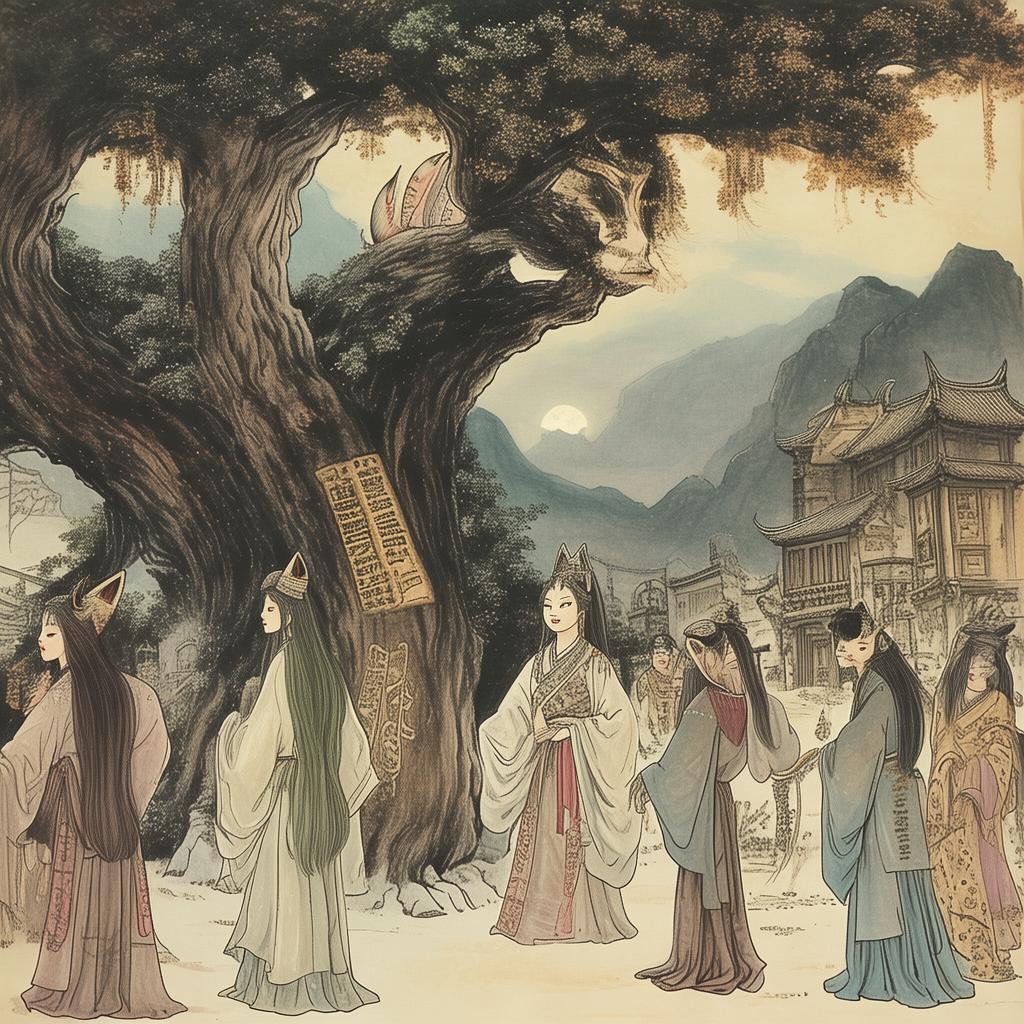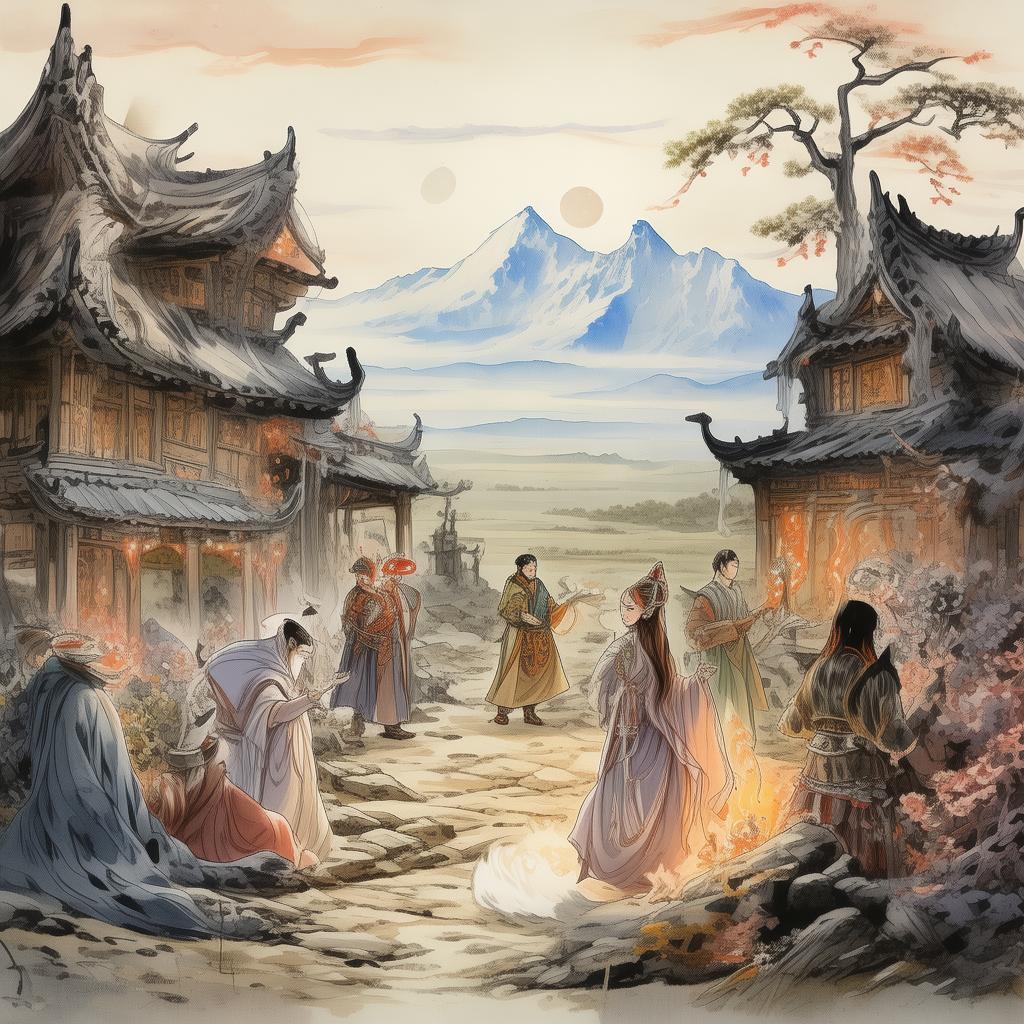The Phantom's Lament: A Folk Tale's Solo Wail
In the ancient village of Linglong, nestled between towering mountains and a whispering river, there was a legend that echoed through the ages. It spoke of a phantom, a specter that haunted the night, its lament a solo wail that could be heard in the dead of the night. The villagers spoke of it in hushed tones, afraid to disturb the silence with their own voices. The legend was the tale of a man named Feng, whose soul was trapped in the world of the living, unable to rest in peace.
Feng was once a revered warrior, known for his bravery and honor. But his life took a dark turn when he betrayed his closest friend, Li, in a time of war. Li had been Feng's closest confidant, a brother in arms, and the betrayal was unforgivable. In a fit of rage, Feng struck Li down with his sword, ending his friend's life and sealing his own fate.
The night of the betrayal, Feng's spirit was torn from his body, his soul wandering the earth in a state of eternal wail. The villagers whispered that his ghost could be seen, a ghostly figure in a white robe, his eyes filled with sorrow and regret. They said that if anyone could hear his solo wail, they would be cursed with their own regrets.
The story of Feng and Li's betrayal had been passed down through generations, a cautionary tale of the consequences of treachery. But little did the villagers know that the legend was about to take a new turn.
One crisp autumn evening, a young girl named Mei, who had always been fascinated by the legend, decided to confront the phantom. She had heard the stories, seen the spectral figure in the distance, and felt an inexplicable connection to Feng's plight. Mei was determined to find out the truth behind the legend and to put an end to the haunting.
As the moon climbed into the sky, Mei ventured out into the village's old, abandoned temple, the place where the phantom was said to appear. The temple was decrepit, its stone walls weathered and its roof caving in. Mei pushed open the creaking door and stepped inside, the air thick with dust and the scent of ancient wood.
The temple was silent, save for the occasional rustle of the wind through the broken windows. Mei moved cautiously, her heart pounding with anticipation. Suddenly, she heard a sound—a faint, haunting melody that seemed to come from everywhere and nowhere at once. It was the phantom's solo wail, a sound that sent shivers down her spine.
Mei's eyes widened as she saw the ghostly figure of Feng appear before her. He was dressed in the same white robe as in the villagers' descriptions, his eyes filled with sorrow. "You have come," he said, his voice a mere whisper.
Mei approached the specter, her curiosity piqued. "Why do you haunt this place?" she asked, her voice barely above a whisper.
Feng's eyes met hers, filled with a deep, searing pain. "I have been trapped here for centuries, unable to find peace. I have sought redemption, but it seems that it is beyond my reach."
Mei's heart ached for the man who stood before her. "Redemption is not always easy to find," she said, "but it is not impossible."
Feng looked at Mei, a flicker of hope in his eyes. "Tell me, young one, how can I find redemption?"
Mei thought for a moment, then spoke. "You must face the consequences of your actions and make amends. You must find someone who can forgive you and who can help you let go of the past."

Feng nodded, his eyes filling with tears. "I will do whatever it takes to find peace."
Mei knew that Feng's journey to redemption would not be easy. She had to find Li's descendants, the ones who could forgive Feng and help him find peace. But Mei was determined to help Feng, to give him a chance at redemption.
Over the next few weeks, Mei traveled the countryside, searching for Li's descendants. She faced many challenges, from the skepticism of the villagers to the dangers of the wilderness. But she never gave up, driven by her desire to help Feng.
Finally, Mei found Li's great-granddaughter, a woman named Hua, who lived in a small village on the outskirts of Linglong. Hua was a kind-hearted woman, but she was also deeply hurt by her ancestor's betrayal. Mei knew that she had to be careful, for Hua's forgiveness was the key to Feng's redemption.
Mei approached Hua with respect and humility, explaining her mission and her belief in Feng's sincerity. Hua listened, her eyes reflecting the pain of generations. "You must understand," she said, "the betrayal of my ancestor still haunts us. But if there is a chance for forgiveness, I will consider it."
Mei knew that she had to help Feng make amends. She returned to the temple, where Feng awaited her. "I have found Hua," she said, her voice filled with hope.
Feng's eyes lit up with a glimmer of light. "Thank you, Mei. I will do whatever it takes to earn her forgiveness."
Mei helped Feng write a letter of apology to Hua, a letter that expressed his deepest regrets and his desire for redemption. She then accompanied Feng to Hua's village, where they met under the watchful eyes of the villagers.
Hua read the letter, her eyes filling with tears. She could feel the pain and regret in Feng's words, and she knew that he was sincere. "I forgive you, Feng," she said, her voice trembling.
Feng's eyes filled with relief and gratitude. "Thank you, Hua. I will never forget this."
As Feng's spirit was released from his earthly form, Mei felt a sense of relief and joy. The legend of the phantom's lament had come to an end, and with it, a new beginning for Feng.
The villagers of Linglong learned from the story of Feng and Mei, understanding that redemption was possible, even for those who had committed the most heinous of acts. The legend of the phantom's lament became a tale of hope and forgiveness, a story that would be told for generations to come.
And so, in the quiet village of Linglong, the haunting lament of Feng's solo wail was no more. The legend had been fulfilled, and peace had finally come to the man who had once been a warrior of honor, now a symbol of redemption and forgiveness.
✨ Original Statement ✨
All articles published on this website (including but not limited to text, images, videos, and other content) are original or authorized for reposting and are protected by relevant laws. Without the explicit written permission of this website, no individual or organization may copy, modify, repost, or use the content for commercial purposes.
If you need to quote or cooperate, please contact this site for authorization. We reserve the right to pursue legal responsibility for any unauthorized use.
Hereby declared.









